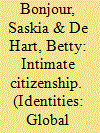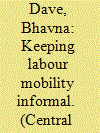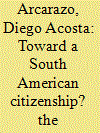|
|
|
Sort Order |
|
|
|
Items / Page
|
|
|
|
|
|
|
| Srl | Item |
| 1 |
ID:
177889


|
|
|
|
|
| Summary/Abstract |
This special issue investigates citizenship and belonging in mixed-status families, i.e. families consisting of both citizens and non-citizens. We critique the standard perception of citizenship as ‘hard on the outside and soft on the inside’. For citizens with non-citizen family members, the exclusionary nature of citizenship is very much ‘inside’, in the very heart of their families. We deploy the concept of ‘performing intimate citizenship’ to understand how citizens deal with migration regulations that hinder them from living with their families. Often this is a first, shocking confrontation with state intervention into their private lives. Protesting such interventions – in court, in collective mobilisation, in letters to the authorities – involves making claims both about who belongs and about what ‘proper’ family is. Thus, citizens and their non-citizen family members ‘perform intimate citizenship’: they express what citizenship is and should be, by mobilising intersecting conceptions of intimacy and of belonging.
|
|
|
|
|
|
|
|
|
|
|
|
|
|
|
|
| 2 |
ID:
134372


|
|
|
|
|
| Summary/Abstract |
Kazakhstan's legal–regulatory framework provides for a small number of quotas for highly skilled foreign workers but has no provisions for legal employment of semi-skilled or low-skilled migrants from the Central Asian states, who enter under the Commonwealth of Independent States (CIS) visa-free regime and work informally in construction, household and service sectors. The lack of acknowledgement of the scale of informal labour migration has denoted an act of strategic neglect on the part of the state, allowing it to render migrant labour illegal, disposable, and keep migrants legally and statistically invisible. Unable to obtain a legal status, migrants nominally comply with the existing legal framework as they also circumvent and subvert it. The article details the entrenched informal regime of labour migration and explains why recent efforts to ‘legalize’ labour through the introduction of a labour patent (licence), as is the case in Russia, are unlikely to bring in significant reforms.
|
|
|
|
|
|
|
|
|
|
|
|
|
|
|
|
| 3 |
ID:
138417


|
|
|
|
|
| Summary/Abstract |
Migration law may be discussed as an example of a clash between two central contradictory globalization processes: first, the transformation of political membership through new forms of quasi-citizenship and their impact for traditional understandings of identity and belonging in the national polity, and second, the securitization of migration and the attempt by the state to control its borders, considered as its “last bastion of sovereignty.” The outcome of this dispute results in conflicting mechanisms of inclusion and exclusion and in illiberal state practices, contrary to fundamental rights, with profound implications for the rule of law in Europe and elsewhere. South America has usually been neglected in academic debates on migration law. This is regretful for two main reasons: first, the development of new liberal ideas on migration in the region which challenge established assumptions on the regulation of migration in Europe, the United States, and elsewhere, and second, the parallel establishment of a South American citizenship. This article will look at this aspect, in particular the Mercosur Residence Agreement, which establishes a free movement of people regime in South America. Its drawbacks and potential will be outlined before exploring possible future scenarios and their importance for other regions, including the European Union (EU).
|
|
|
|
|
|
|
|
|
|
|
|
|
|
|
|
|
|
|
|
|